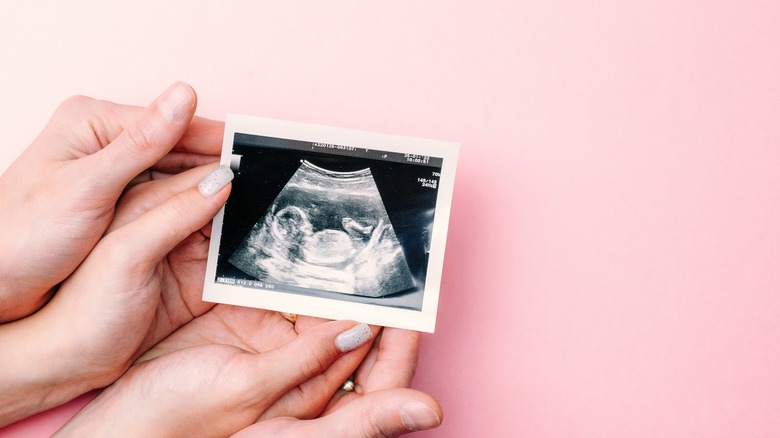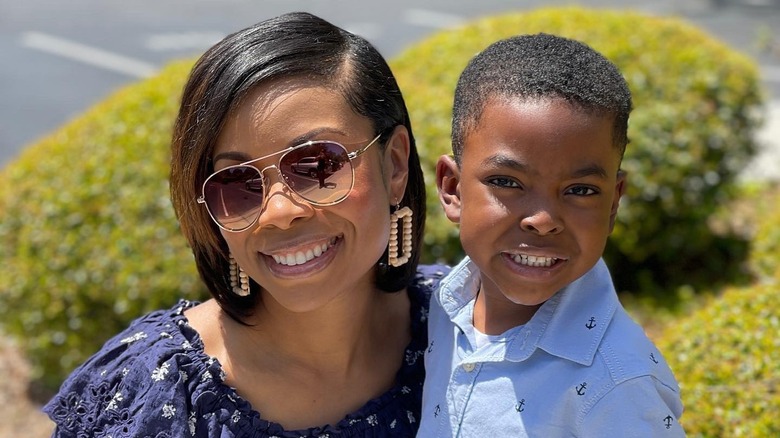Natalist Medical Advisor Dr. Kenosha Gleaton's Advice For People Trying To Conceive - Exclusive
Trying to conceive a child can be an extremely stressful process, especially for people who are struggling with infertility. For many, trying to sift through the incredible amount of information out there about fertility and conception just adds to the stress. Finding reliable, evidence-based advice in the sea of misinformation is difficult, which is why it's so important to seek advice from reliable sources.
Dr. Kenosha Gleaton is one of those reliable sources. She's an OB-GYN at The EpiCentre in Charleston, South Carolina, a medical advisor for Natalist — a science-backed fertility and pregnancy brand — and a mom who struggled with infertility before having her two sons. Through her work with people trying to conceive and her own experience with trying to get pregnant, Dr. Gleaton has learned a lot about what works and what doesn't, as well as how to take care of yourself during the process.
In an exclusive interview with Health Digest, Dr. Gleaton shared her expert advice for those trying to get pregnant.
Lifestyle matters
According to Dr. Kenosha Gleaton, people trying to conceive need to take care of themselves so their bodies feel prepared to carry another life.
"If you're on the plane, they say, 'Take care of you first before helping your infant,'" she remarked. "The body definitely signifies that to us."
When she was trying to conceive, Dr. Gleaton was chronically sleep-deprived because she had just finished her residency and had started practicing as an OB-GYN. Every morning, she hit the snooze button until she had just enough time to rush out of the house. She started every morning stressed and stayed that way. Gleaton was also stressed because she couldn't get pregnant and no one could figure out why.
"It dawned on me that every day when I leave the house, my cortisol level shoots up because I leave in such a hurried fashion," she said. "Why would my body want to bring pregnancy into this chaotic state?"
She made some changes that allowed her to get enough sleep and manage her stress. Though it didn't pay off immediately, she did end up spontaneously conceiving her first son after a long struggle with infertility. Dr. Gleaton also stressed the importance of diet and regular exercise when trying to get pregnant, saying that when your body is as healthy as possible, conception is much easier.
Increasing your chances
Dr. Kenosha Gleaton shared a few simple things that people can do to increase their chances of conceiving.
"Many times, patients are just missing their fertility window," she explained. "I always recommend doing the ovulation predictor test to ensure you know exactly when your LH levels are rising so that you can be more intentional about getting pregnant."
As a medical advisor for Natalist, she recommends their ovulation tests, which are doctor recommended and backed by extensive research. Dr. Gleaton also recommends taking supplements that have been proven to help with fertility.
"Every woman should take a prenatal vitamin at some point in our life," she stated. "Vitamin D is often one that we recommend, [and] CoQ10."
Dr. Gleaton went on to say that Natalist has done an incredible amount of research into supplements that actually help people conceive, and all their supplements are developed using that research. They're also rigorously tested. She stressed that each person's supplementation needs will be different based on their age and their body's needs, so everyone should check in with their OB-GYN before adding any supplements to their daily regimen.
Visit the Natalist website for more information on how you can receive support at every stage of your reproductive journey. Plus, you can explore their wide variety of products ranging from at-home ovulation and pregnancy tests to evidence-backed supplements and books.



